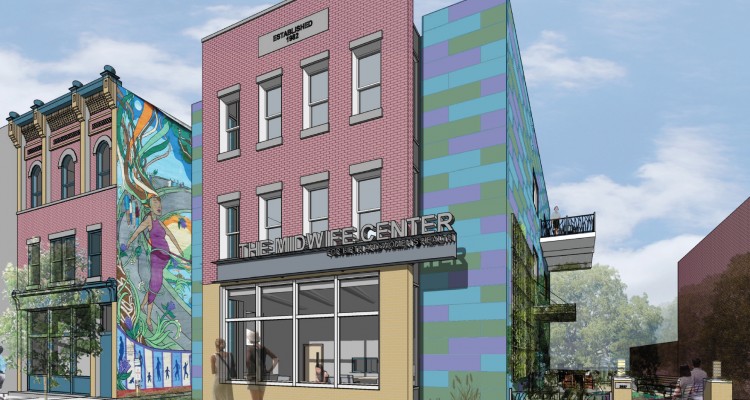
The Midwife Center set to become the nation’s largest freestanding birth center
The Midwife Center (TMC) in Pittsburgh saw the number of births almost triple between 2002 and 2014. The center assisted 170 births in 2002 and is projected to deliver 470 babies this year. The center’s routine gynecology practice has also grown, with an expected 1500 visits by the end of this year.
All this growing demand has prompted the center to expand its facilities which will double its current size.
Planning for TMC’s expansion began in 2013 when they bought the lot next to its current location in the Strip District. The new facility–designed by Rothschild Doyno Collaborative–will be built on this site, adding two more birth suites (for a total of five) and four more examination rooms as well as a dedicated classroom that will allow for new education programs.
The center has raised $1.7 million of the campaign’s $3 million goal and expects to break ground in 2016. Once completed, The Midwife Center will be the largest freestanding birth center in the country.
And it will allow them to add new services such as behavioral health.
“Women come to us for their primary gynecology care more and more—even younger women who haven’t had babies yet,” says Christine Haas, TMC’s executive director.
“There’s been a change as women are looking for alternatives. Women are making different choices in childbirth and more research has been done that demonstrates the safety, the cost savings and client satisfaction that goes with that,” Haas adds.
In 2012, births with midwives rose to an all-time high at eight percent and that continues to rise. When President Obama introduced the Affordable Care Act, it included an unprecedented provision of 100 percent Medicare coverage of midwife births, up from a previous 65 percent.
TMC has grown from four to seven midwives since 2002, and has introduced a fellowship program not only to help service demand but also to provide a training ground for new midwives, something that has been lacking in our region. Last week, the University of Pittsburgh announced a new Doctoral degree in Midwifery to be offered in the School of Nursing next year, to respond to the growing demand.
TMC’s outcomes outperform national statistics for non-midwife assisted births. C-sections at TMC are a low 8.5% (vs. a 32.7% national average), preterm births are 1.4% (vs. 11.4% nationally) and low birth weight babies are .2% (vs. 8%).
“I think it is significant to note that these statistics are consistent by race and by public and private insurance,” Haas adds.
Midwifery care during pregnancy is markedly different from typical OB-GYN care. At TMC, the first prenatal visit is at least an hour. “We want to make sure that we establish a good relationship from the beginning,” says Haas.
Prenatal care at TMC, which was established in 1982, focuses on a holistic approach—considering everything from diet to more subtle aspects such as social support.
“For the actual birth, midwives give most continuous support throughout labor, using different techniques to help women have babies with fewer interventions—such as allowing them to walk around and have access to a hot tub to ease labor pains. We approach intervention only as needed and not as routine,” says Haas.
Recent documentaries on midwife care such as The Business of Being Born have helped educate the public and alleviate misconceptions. Haas has certainly seen the difference in 13 years. “When I started in 2002, a lot of the times I was starting from scratch. Today, as we’re talking to different people in the community, there’s definitely a much higher level of understanding.”
This article originally appeared in NEXTpittsburgh.
Featured photo courtesy of The Midwife Center